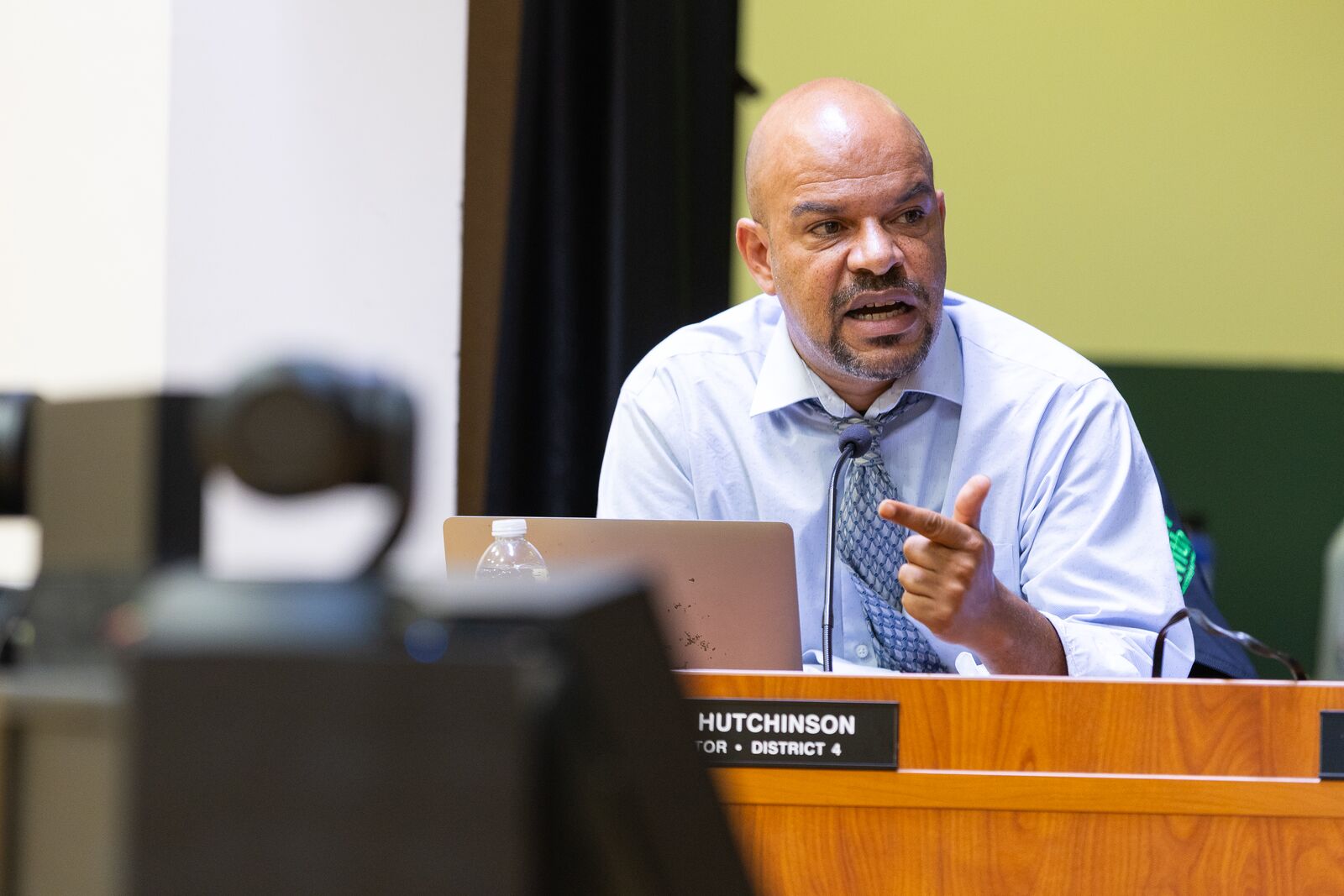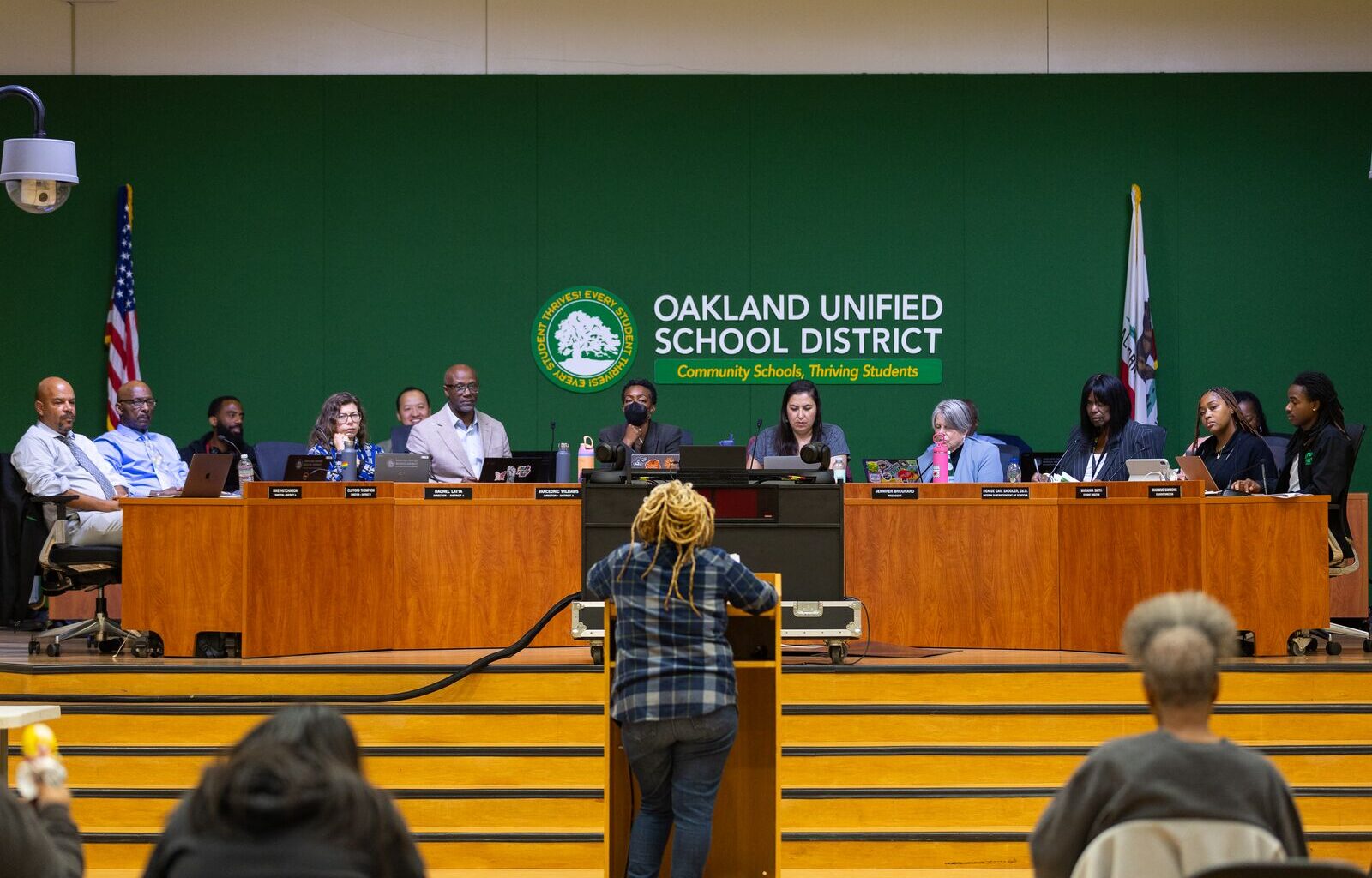After five hours of haphazard discussion, the Oakland Unified School District board met its deadline for a budget plan with 22 minutes to spare.
The superintendents of Alameda County and OUSD had imposed an Oct. 8 deadline for the board to give direction to district budget staff on how to address overspending this year — and solve projected deficits over the next two years. At stake is the district’s local control over budget decisions. Over the summer, the board celebrated as OUSD exited state receivership after 22 years. That means the board no longer has the backstop of oversight by an outside trustee.
The resulting plan was made up of a mishmash of resolutions and amendments from board directors as well as input from district staff. The final adopted resolution was supported by directors Rachel Latta, Jennifer Brouhard, VanCedric Williams, and Valarie Bachelor, while directors Mike Hutchinson, Patrice Berry, and Clifford Thompson voted against it.
To resolve this year’s budget gaps, the board has directed the superintendent to first implement a hiring freeze and review the district’s current openings. If that isn’t enough, they’ve told the superintendent and her staff to pursue other options, including freezing or canceling contracts, reducing travel, and consolidating purchases. It says that no scenarios should include school closures or mergers.
In November, district staff will come back with options for the 2026-2027 budget that include restructuring the central office, reducing administrative positions, and cutting spending on contracts, as well as a plan to increase enrollment. The scenarios will total $100 million in adjustments.
The resolution, introduced at the last meeting by Brouhard and Bachelor, the board’s president and vice president, passed with amendments introduced last night by Latta, who represents District 1.
The board discussion went in circles for hours, with directors arguing for specific amendments and resolutions being voted down and then brought back to the floor for discussion. As the conversation entered its third hour with no consensus, Denise Saddler, OUSD’s interim superintendent, tried to bring the focus back to the board’s task: providing guidance on where to look for cuts. She compared the situation to completing a jigsaw puzzle and putting together the corners and edges of the puzzle before filling it in.
“What I need from all of you is to hear what the parameters are of what you would like staff to look at so we can do our best work to bring you options,” she said. “I want to respect that every single one of you has been doing some thinking about this and writing about it and have amendments and proposals. I urge you to give us the outside of the puzzle so we can go forth and do our best work.”
Competing resolution to cut special ed, literacy supports
This school year, OUSD has been spending $4 million more per month than it brings in, said chief business officer Lisa Grant-Dawson, requiring immediate adjustments for the already adopted 2025-2026 budget. The board will need to cut $78 million from the unrestricted general fund for 2026-2027 and $73 million from 2027-2028, according to Alysse Castro, the Alameda County superintendent, who is responsible for assessing all school district budgets in the county.
In a Sept. 12 letter, Castro wrote that the board needed to approve a plan by Oct. 8 to address budget gaps for this school year and the next. Castro said she will evaluate those plans by Nov. 8, when she has to submit to the state superintendent of public instruction a list of districts whose budgets have not been approved and require intervention.
Last night Hutchinson submitted a competing resolution, which directed staff to consider some of the same items, such as hiring and contract freezes, but added a menu of other options for this year such as cutting substitutes, furloughing staff who don’t work at school sites, reducing assistant principals, and reducing support for small schools, newcomers, English language learners, and special education. Hutchinson emphasized that the list, through which he aimed to cut $15 million from this year’s budget, was not prescriptive, and staff would have the discretion to recommend some cuts and not others.
 Mike Hutchinson, OUSD director for District 4, argues in favor of the resolution he put forward to cut at least $15 million from the current year’s budget. Credit: Estefany Gonzalez for The Oaklandside
Mike Hutchinson, OUSD director for District 4, argues in favor of the resolution he put forward to cut at least $15 million from the current year’s budget. Credit: Estefany Gonzalez for The Oaklandside
“We are in a budget crisis and we need to cut projected spending for this year,” Hutchinson said. “If we’re not sitting around a table and doing this collectively, the county is going to come in and close whatever they want. If we are in receivership, they literally have the legal authority to rip up the contracts we have with our labor partners.”
Several directors objected to the plan.
Bachelor, who represents District 6, was concerned with the potential consequences of furloughing staff, eliminating school leadership roles, and reducing funds for specific student groups.
“Those pieces do not fit my definition of a student-centered budget,” Bachelor said. “I’m very concerned that it could lead to multiple rounds of impact bargaining with multiple bargaining units, which could lead to potential labor action that could disrupt the education of our students.”
Hutchinson’s resolution failed, with Latta, Brouhard, Williams, and Bachelor voting against it and Hutchinson, Berry, and Thompson in support.
An attempt to incorporate some of the points from Hutchinson’s resolution into the leadership resolution, including staff furloughs, also failed. Latta, Brouhard, and Berry were the only yes votes.
Parents call for saving special ed, making cuts at headquarters
About 25 people made public comments, half of them students, who spoke about the importance of maintaining specific programs at their schools, like restorative justice, afterschool homework help, and programs from the district’s office of equity.
“Our restorative justice program can help make our school a safer, more caring, and connected place,” said a student at Edna Brewer Middle School who identified herself as Emmy. “Students learn how to take responsibility, build trust, and repair harm, which makes a huge difference. That’s why I’m asking you, no matter what decisions are being made about the budget, to please keep restorative justice funded and please don’t cut it. Programs like ours don’t just change schools, they change lives.”
Parents and community members urged the board to protect special education supports and suggested eliminating administrative roles.
“Keep your hands off of special education. Cut something else,” said Ginale Harris, a McClymonds parent. “I would ask all of you to go to your district schools and see what [upper management staff] do and evaluate, ‘Is this really important? Do we need them here?’”
Harris and others repeatedly read from a 2018 grand jury report that excoriated district leadership for overspending, skewed priorities, and loose financial controls.
“The longer you delay, the more difficult the decisions become, and the more trust you lose from family, staff, and students that you serve,” said Viveca Ycoy-Walton, a parent and organizer with Families in Action. “We need transparency, we need leadership. Most of all, we need action. This community is watching, and we won’t accept silence where there needs to be solutions.”
District staff are expected to bring budget scenarios to the board for review at a special meeting on Nov. 19.
“*” indicates required fields

